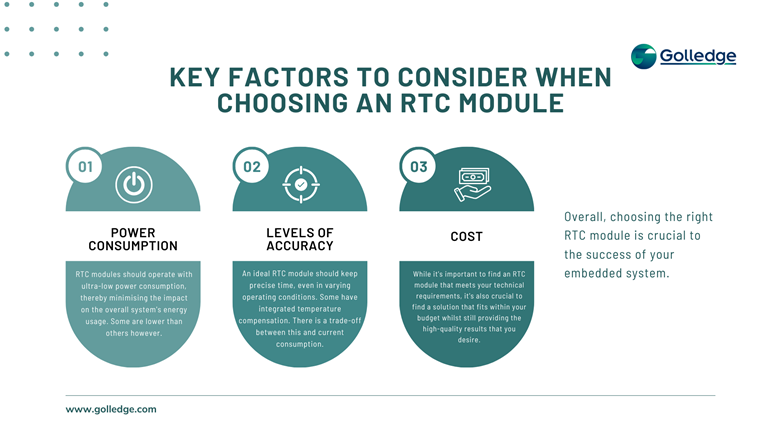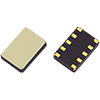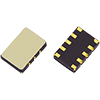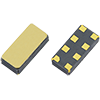Using RTC Modules for Accurate Timekeeping in Embedded Systems
1 Aug 2023
INSPIRE SERVICES
In our increasingly digitised world, the accurate measurement of time is vital. Timekeeping is not just about hours, minutes, and seconds; it underpins the functioning of numerous electronic systems, ranging from our everyday gadgets to critical industrial equipment.
Ensuring this precision in timekeeping, particularly in embedded systems, is the prime objective of Real Time Clock (RTC) modules.
Real time clock in embedded system maintains precise tracking of the current time and date, regardless of the state of the device they inhabit, whether powered on or off. They are critical in many of our most common electronic devices, from smartphones to laptops.
In the following article, we will delve further into the world of RTC modules, shedding light on their working principles, their importance in accurate timekeeping, and their use in embedded systems.
Understanding Real Time Clock (RTC) Modules
Real Time Clock (RTC) modules are pivotal in ensuring digital accuracy in our contemporary landscape. Whether in the smartphones that connect us, the laptops that aid our productivity, or the advanced tablets that entertain us, RTC modules ensure precise tracking of the current time and date.
Therefore, what does real time clock mean? Essentially, an RTC module is a digital clock integrated into computerised systems, providing accurate timekeeping even when the device is powered off.
The secret to an RTC module's continuous operation lies in its power source. Most RTC modules draw power from an alternate source, such as lithium primary batteries, rechargeable batteries, or supercapacitors, allowing them to operate independently of the device's main power supply.
For instance, in most consumer-grade motherboards, the RTC is powered by a single battery. If this battery is removed, the RTC resets, illustrating the module's reliance on this separate power source for its consistent operation.
While many microcontrollers have on board RTC circuits the fact they they have been made using the same process as the rest of the microcontroller means they have not been made on a process that is optimised for low speed, low leakage, operation means they can’t reach the ultra low levels of RTCs made on a dedicated low leakage process. Low leakage dual supply arrangements are also rare with embedded RTCs.
Consequently, RTC modules are able to keep accurate time regardless of power outages or system shutdowns, playing an indispensable role in our digital lives.
The crucial role of RTC in embedded systems
Embedded systems, which are specialised computer systems designed to perform dedicated functions, often rely on RTC modules for accurate timekeeping. Whether it's a digital watch, a car's electronic system, or a complex industrial control system, the role of RTC modules is paramount.
They not only provide the exact time but also ensure that time-related functions, such as scheduling, alarm features, and data logging, are accurately performed.
RTC modules not only offer accurate timekeeping but are also extremely versatile, with different types available to suit various applications. Their ability to operate with ultra-low power consumption makes them an optimal choice for devices where energy efficiency is crucial.
Types of RTC modules
There are numerous RTC modules in the market, each with their unique features and applications.
RTC modules come with an integrated crystal , providing a complete timekeeping solution within a single package.
Most have features such as alarms, timers, and interrupt functions, providing increased functionality within embedded systems.
RTC modules also vary in terms of their power sources. While some are powered by lithium batteries, others use rechargeable batteries or supercapacitors, allowing for flexibility in system design. Some have dual power sources with automatic switch over if one source is removed.
Furthermore, RTC modules from Golledge Electronics are selected for their balance of highly competitive pricing and wide range of specifications, making them suitable for a vast array of applications in the realm of embedded systems.
Implementing RTC Modules: Challenges and best practice
To effectively implement an RTC module into your chosen embedded system, it's typically integrated into the system's circuitry and connected to a separate power source. This allows the RTC module to continue operating, even when the primary power source of the embedded system is turned off or disrupted.
However, implementing RTC modules can come with its own set of challenges.
For example, integration may require careful consideration of the system's power management to ensure that the RTC module can function efficiently without losing too much energy to the rest of the system.
Additionally, the integration should be done in such a way that it minimises the risk of interference from other components, which could potentially cause real time clock problems.
Fortunately, best practices have been established to help mitigate these challenges. Our advice is as follows:
-
Carefully choose the right RTC module for your application, considering factors such as power consumption and accuracy.
-
Consider the specific features of the RTC module that you desire to have in your application, such as event logging or timer functions.
-
The RTC module's placement within the system's circuitry should be planned meticulously to minimise interference.
-
Ensure that the RTC module's power source, whether a lithium battery, rechargeable battery, or supercapacitor, is reliable and capable of providing a consistent supply.
-
Use frequent testing and calibration to ensure that the RTC module maintains its accuracy over time. This includes not only initial testing during the design phase but also ongoing checks throughout the life of the system.
In summary, with careful planning and adherence to these best practices, RTC modules can be successfully implemented in embedded systems to provide reliable, accurate, constant outputfor your electronic device.
Key factors to consider when choosing an RTC Module
 As mentioned above, choosing the right RTC module for your embedded system is key when designing and producing an electronic device or product.
As mentioned above, choosing the right RTC module for your embedded system is key when designing and producing an electronic device or product.
The process can appear daunting, however, by considering a few key factors, you can ensure that you select the module that best meets your needs. We’ve listed the top factors to consider below:
Power consumption
Power consumption is a critical factor, particularly for systems where energy efficiency is paramount.
RTC modules should operate with ultra-low power consumption, thereby minimising the impact on the overall system's energy usage. Some are lower than others however.
Levels of accuracy
Secondly, accuracy is of the essence.
An ideal RTC module should keep precise time, even in varying operating conditions. Some have integrated temperature compensation. There is a trade-off between this and current consumption.
Cost
Finally, commercial pricing should be taken into account. While it's important to find an RTC module that meets your technical requirements, it's also crucial to find a solution that fits within your budget whilst still providing the high-quality results that you desire.
Overall, choosing the right RTC module is crucial to the success of your embedded system.
At Golledge Electronics, we're here to guide you through this process and provide you with RTC modules that ensure accurate timekeeping, efficient power usage, and excellent value for money. Find out more about how to buy class-leading products from Golledge if you are eager to design a reliable application.
What are the applications of real time clock?
The importance of RTC modules spans across a multitude of applications, underlining their universal relevance in our increasingly digital world.
Let's take a look at a few of these applications where RTC modules play a critical role.
Consumer electronics
Firstly, in consumer electronics such as smartphones, tablets, and laptops, RTC modules ensure that your devices keep accurate time, even when powered off or reset.
This ensures that you always have the correct time at your fingertips, from the moment you power on your device.
Industrial control
Industrial control systems are another area where RTC modules prove essential. They assist in maintaining accurate logs of events, allowing for efficient troubleshooting and better system maintenance.
Accurate timekeeping in these systems is critical for synchronising processes and ensuring smooth operations.
Embedded system
As already mentioned, embedded systems in the automotive industry also rely on RTC modules. From time-stamping crucial data in a car's electronic control unit to ensuring accurate timekeeping in a vehicle's infotainment system, RTC modules are integral to the functionality of modern vehicles.
Security systems
Security systems, both residential and commercial, are another key application. RTC modules provide accurate time-stamping of events, crucial for incident tracking and forensic analysis.
The overall benefits of RTC modules in these systems are manifold. They enable precise timekeeping, allow for effective logging and time-stamping, and can enhance the overall functionality of the system.
Importantly, their ability to operate independently of the device's main power source also means they provide reliable performance, even in the event of power disruptions.
From our daily-use gadgets to complex industrial machinery, RTC modules provided by Golledge Electronics continue to ensure accurate timekeeping, proving their worth in diverse applications across different industries.
Partnering with Golledge for your RTC module needs
In an era where timekeeping is integral to a multitude of applications ranging from consumer electronics to industrial machinery, the importance of real time clock accuracy cannot be overstated.
These key components ensure reliability, precision, and functionality to embedded systems, playing a critical role in our modern world.
At Golledge Electronics, we appreciate the pivotal role of RTC modules and remain dedicated to providing a range of quality RTC products that serve this purpose. Our RTC modules, selected for their ultra-low power consumption, precision, and competitive pricing, are a testament to our unwavering commitment to quality and customer satisfaction.
In addition to RTC modules, we offer a wide array of frequency control products including quartz crystals , oscillators, SAW filters and many more.
So, whether you're looking for RTC modules for accurate timekeeping systems or other frequency control products to fine-tune your systems to build your applications, Golledge Electronics can provide the help and guidance that you need.
Please do not hesitate to contact us for more information to discover how we can meet your needs. Let's navigate the world of accurate timekeeping together.



